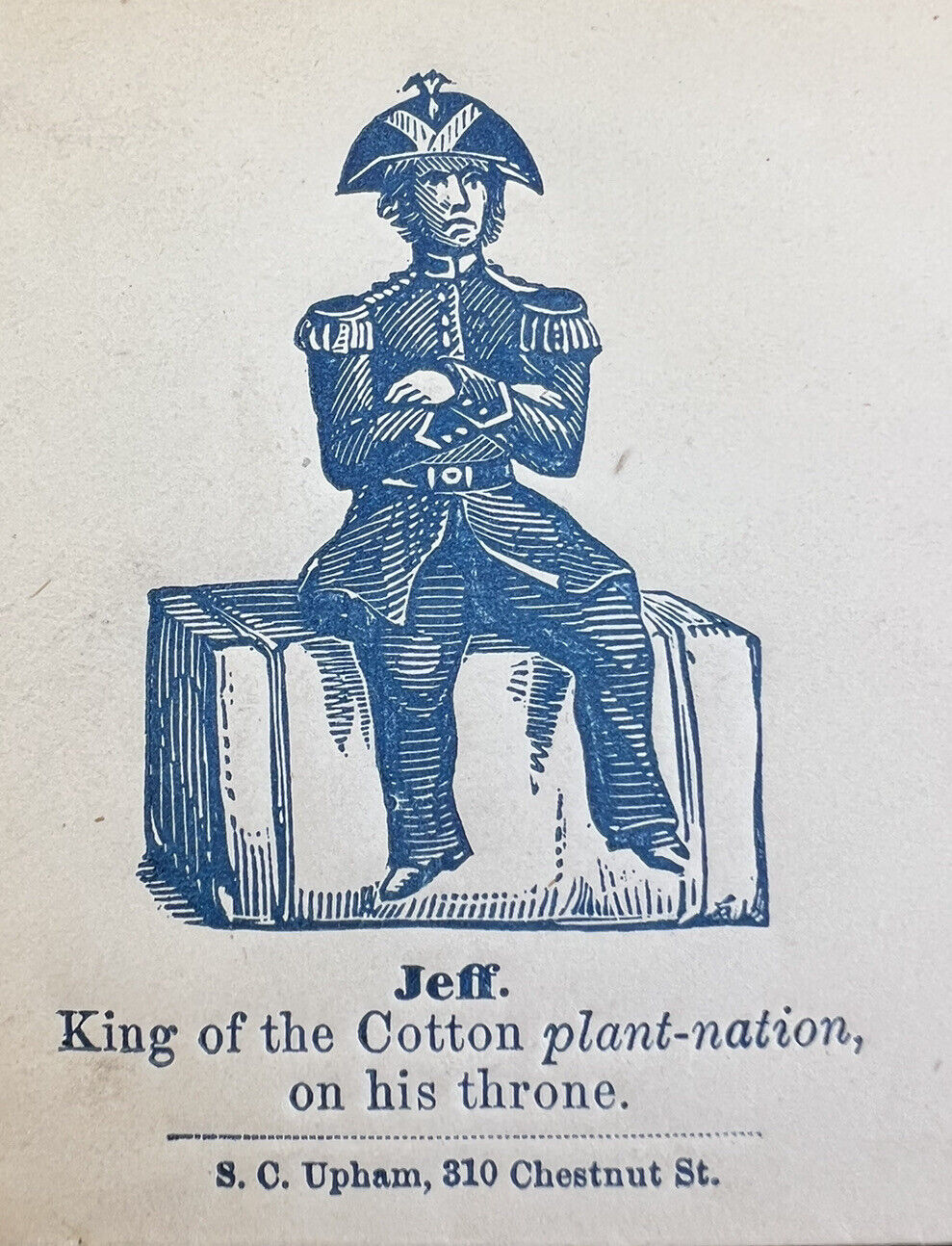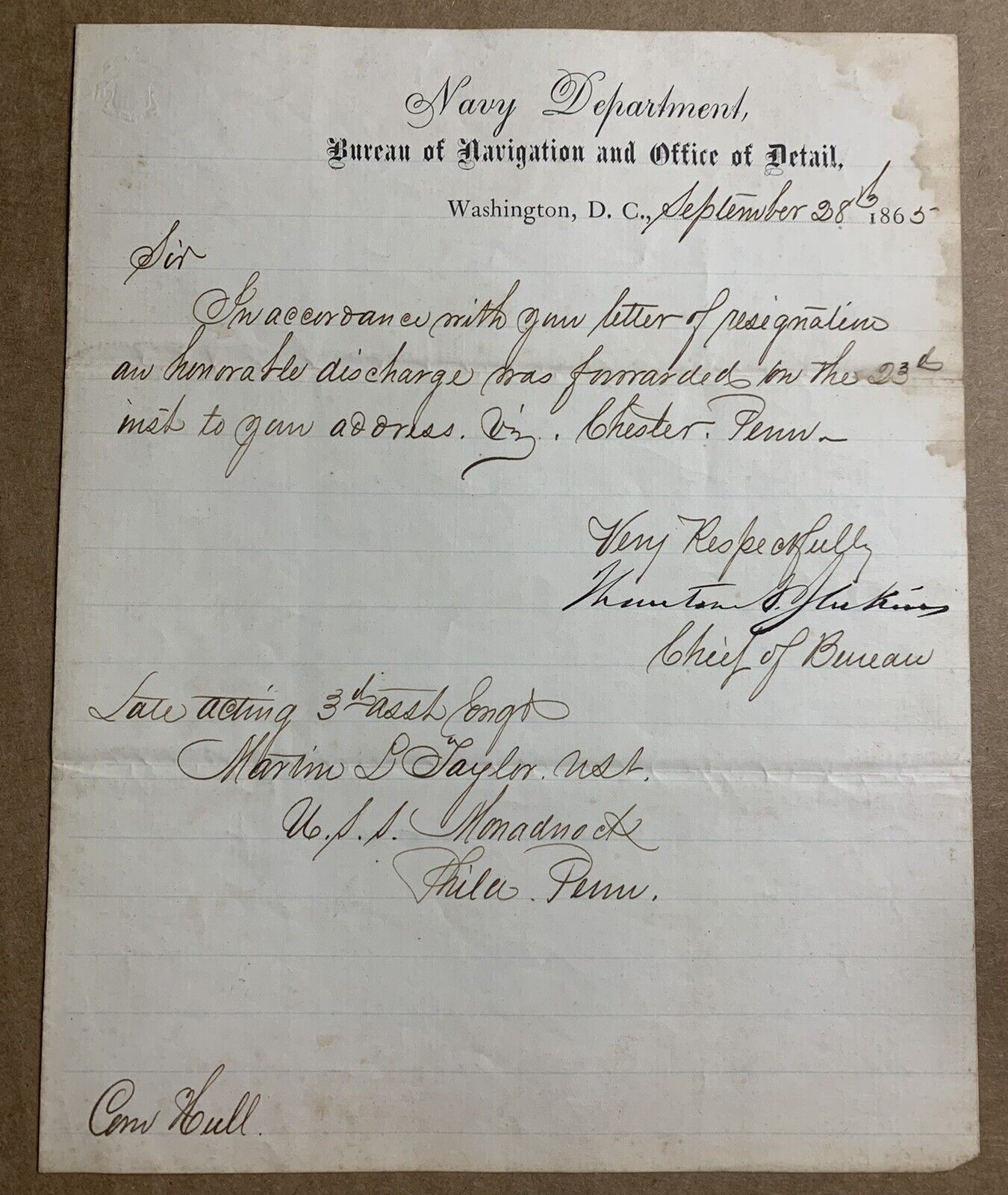-40%
SIGNED CIVIL WAR GENERAL WIA ANTIETAM BATTLE COLONEL 10th PA INFANTRY CONGRESS
$ 86.93
- Description
- Size Guide
Description
INVREF#CL5-73ADONIRAM JUDSON WARNER (1834 - 1910) CIVIL WAR UNION BVT BRIGADIER GENERAL, BATTLE OF ANTIETAM WIA COLONEL OF THE 10th PENNSYLVANIA RESERVES INFANTRY, COLONEL OF THE VETERAN RESERVE CORPS., US DEMOCRATIC PARTY CONGRESSMAN FROM OHIO 1879-1881 and 1883-1887 – A LEADER IN THE “FREE-SILVER” MOVEMENT & RAILROAD BUILDER and EXECUTIVE! Warner was appointed Colonel of the 10th PA on 25 April 1863, but was further injured in a fall at the battle of Gettysburg in July ‘63, and was then made Colonel of the 17th Regiment, Veteran Reserve Corps on Nov. 15, 1863. By 1864 he was judged physically unfit for active service, was on court-martial duty, and took command at Indianapolis. After the War moved to 1866 moved to Marietta, Ohio in 1866 and was in the oil, coal, and railroad businesses. He published "Appreciation of Money" (Philadelphia, 1877), "Source of Value in Money" (1882), and other works on economics. HERE’S WARNER’S SIGNATURE REMOVED FROM A 19th CENTURY AUTOGRAPH ALBUM, and SIGNED: “A. J. Warner Marietta, Ohio.” The document measures 7" x 2¾” and is in very fine condition. A FINE ADDITION TO YOUR AMERICAN CIVIL WAR “GENERALS IN BLUE” MILITARY / POLITICAL AUTOGRAPH, MANUSCRIPT & EPHEMERA COLLECTION! BIOGRAPHY OF THE HONORABLE GENERAL A. J. WARNER Adoniram Judson Warner (January 13, 1834 – August 12, 1910) was a U.S. Representative from Ohio and a general in the Union Army during the American Civil War. Biography Born in Wales, New York (near Buffalo, New York), Warner moved with his parents to Wisconsin at the age of eleven. He attended school in Beloit, Wisconsin, and New York Central College, McGrawville, New York. He was principal of Lewistown (Pennsylvania) Academy, superintendent of the public schools of Mifflin County, Pennsylvania, and principal of Mercer Union School, Pennsylvania from 1856 to 1861. During the Civil War, he was commissioned captain in the Tenth Pennsylvania Reserves July 21, 1861, lieutenant colonel May 14, 1862, colonel April 25, 1863, and colonel of the Veteran Reserve Corps November 15, 1863. He was brevetted brigadier general March 13, 1865. After the return from the Peninsula, Colonel Warner rendered important service throughout Pope's campaign and at South Mountain. But it was at Antietam that he gave the most signal proof of his ability as a soldier. As the battle opened he was ordered by General Hooker to proceed to the extreme right of the line, and as far to the front as he could, and report the movements of the enemy. As he went forward he discovered heavy masses of the foe pushing out upon that part of the field where Hooker was already most heavily engaged [...] 'I immediately,' he says in his report, 'threw out nearly the whole regiment into a cornfield, as skirmishers [...] For about twenty minutes the skirmishing was kept up sharply, and the enemy's whole force was held at bay [...] But Colonel Warner, while doing bravely and well for his country, was himself sorely scourged. After having his horse twice struck, his sword once, one ball graze his right side and another pass through his coat, he was hit by a Minnie ball in the right hip, which shattered the pelvis bone and buried itself." After the battle of Antietam, Colonel Warner was further injured in a fall at the battle of Gettysburg, and made Colonel of the 17th Regiment, Veteran Reserve Corps (the Invalid Corps) on November 15, 1863. By 1864 he was judged physically unfit for active service, was on court-martial duty, and took command at Indianapolis. Warner studied law and was admitted to the bar in Indianapolis, Indiana in 1865 but never practiced. At the conclusion of the war, he returned to Pennsylvania, and in 1866 moved to Marietta, Ohio. He engaged in the oil, coal, and railroad businesses. He published "Appreciation of Money" (Philadelphia, 1877), "Source of Value in Money" (1882), and other works on economics. He was a leader in the Free Silver movement. Warner was elected as a Democrat to the Forty-sixth Congress (March 4, 1879 – March 3, 1881). He was an unsuccessful candidate for reelection in 1880 to the Forty-seventh Congress. Col. Warner was elected to the Forty-eighth and Forty-ninth Congresses (March 4, 1883 – March 3, 1887). He was not a candidate for reelection in 1886. He served as delegate to the 1896 Democratic National Convention. He engaged in street trolley railway construction in the District of Columbia and built railroads in Ohio. From about 1898 until six months before his death, he engaged in transportation and power development in Georgia. Colonel Warner died in Marietta, Ohio August 12, 1910. He was interred in Oak Grove Cemetery. He was the subject of The Ordeal of Adoniram Judson Warner: His Minutes of South Mountain and Antietam, an article by James B. Casey in Civil War History magazine (September l982, pp. 213-36). PROVENANCE HISTORY OF ORIGINAL PURCHASE Proud member of the Universal Autograph Collectors Club (UACC), The Ephemera Society of America, the Manuscript Society & the American Political Items Collectors (APIC) (member name: John Lissandrello). I subscribe to each organizations' code of ethics and authenticity is guaranteed. ~Providing quality service & historical memorabilia online for over twenty years.~










